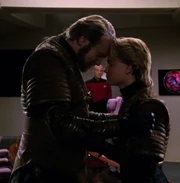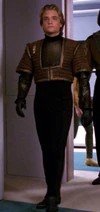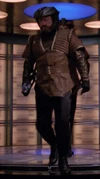m (Robot: Automated text replacement (-\[[Hh]ttp://www.st-minutiae.com/(.+?)\.txt] +{{Star Trek Minutiae|\1.txt}})) Tag: apiedit |
|||
| (4 intermediate revisions by 3 users not shown) | |||
| Line 1: | Line 1: | ||
[[File:Endar.jpg|thumb|[[Endar]], a Talarian male]] |
[[File:Endar.jpg|thumb|[[Endar]], a Talarian male]] |
||
| − | The '''Talarians''' were a [[warp drive|warp capable]] [[humanoid]] [[species]] |
+ | The '''Talarians''' were a [[warp drive|warp capable]] [[humanoid]] [[species]] from the [[Talarian homeworld]]. |
==Physiology== |
==Physiology== |
||
| Line 9: | Line 9: | ||
==Society and history== |
==Society and history== |
||
[[File:Talarian logo, Suddenly human.png|150px|right|The Talarian logo, [[2367]]]] |
[[File:Talarian logo, Suddenly human.png|150px|right|The Talarian logo, [[2367]]]] |
||
| − | Talarians followed a strict set of traditions and customs. Their society was rigidly [[patriarchal]], where a woman could never outrank a man, and |
+ | Talarians followed a strict set of traditions and customs. Their society was rigidly [[patriarchal]], where a woman could never outrank a man, and encouraged warrior-like behavior. ({{TNG|Suddenly Human}}) |
| − | {{bginfo|A [[deleted scene]], still present in the script of the episode, revealed that among Talarians, females were only for mating and working; "Talarians don't have mothers", just fathers.}} |
+ | {{bginfo|A [[deleted scene]], still present in the script of the episode, revealed that among Talarians, females were only for mating and working; "Talarians don't have mothers", just fathers. {{Star Trek Minutiae|academy/literature329/176.txt}}}} |
[[File:Talarian script.gif|thumb|left|Talarian script]] |
[[File:Talarian script.gif|thumb|left|Talarian script]] |
||
| Line 18: | Line 18: | ||
Talarians were very competitive; games, tests and competitions were an important part of their culture, and children regularly engaged in contests and challenges. Sharing victory was an important part of the games. Furthermore, when undertaking the tests, pain was not a consideration as passing the tests is what mattered. |
Talarians were very competitive; games, tests and competitions were an important part of their culture, and children regularly engaged in contests and challenges. Sharing victory was an important part of the games. Furthermore, when undertaking the tests, pain was not a consideration as passing the tests is what mattered. |
||
| − | {{bginfo|According to a cut scene, men's purpose was to pass the tests and to become strong. If they do not test themselves constantly, Talarians "become weak and the weak die quickly." Women, while weak, were spared this fate by men protecting them.}} |
+ | {{bginfo|According to a cut scene, men's purpose was to pass the tests and to become strong. If they do not test themselves constantly, Talarians "become weak and the weak die quickly." Women, while weak, were spared this fate by men protecting them. {{Star Trek Minutiae|academy/literature329/176.txt}}}} |
[[File:Talarian bow.jpg|thumb|left|A Talarian bow]] |
[[File:Talarian bow.jpg|thumb|left|A Talarian bow]] |
||
| Line 67: | Line 67: | ||
{{bginfo|In this episode the Talarian script is also visible above a door near the reactor.}} |
{{bginfo|In this episode the Talarian script is also visible above a door near the reactor.}} |
||
| − | Attacking a superior officer, like a captain, was considered the highest offense and was punishable by [[ |
+ | Attacking a superior officer, like a captain, was considered the highest offense and was punishable by [[execution]], usually carried out by the offended officer. This was applicable to all superior officers no matter their army or species: for example, the custom would allow a [[Starfleet]] commander to execute a rude Talarian soldier. |
Talarian uniforms reflected a militaristic culture. Talarian officers and boys having passed the Age of Decision wore a similar brown padded uniform-vest and black trousers. Large black helmets and black leather gloves are a standard part of the uniform, and a ribbed silvery-black undergarment was worn under the brown vest. Large rifles were worn on a shoulder strap on the right side of the body. |
Talarian uniforms reflected a militaristic culture. Talarian officers and boys having passed the Age of Decision wore a similar brown padded uniform-vest and black trousers. Large black helmets and black leather gloves are a standard part of the uniform, and a ribbed silvery-black undergarment was worn under the brown vest. Large rifles were worn on a shoulder strap on the right side of the body. |
||
Revision as of 18:51, 21 March 2015

Endar, a Talarian male
The Talarians were a warp capable humanoid species from the Talarian homeworld.
Physiology
Talarians were characterized by a distinctive hairless enlargement of the coronal area of the skull extending in two lobes to the back of the head. Talarian blood was red, and Talarians were prone to radiation burns and respiratory distress. (TNG: "Suddenly Human")
Raktajino was known to have intoxicating effect on Talarians. (DS9: "A Simple Investigation")
Society and history
Talarians followed a strict set of traditions and customs. Their society was rigidly patriarchal, where a woman could never outrank a man, and encouraged warrior-like behavior. (TNG: "Suddenly Human")
Talarian script
Xenophobic tendencies among Talarians were hinted at by Jono's revelation in 2367 that Talarians wore gloves when touching aliens. Removing the gloves and touching someone with the bare hands was a sign of affection and respect.
Talarians were very competitive; games, tests and competitions were an important part of their culture, and children regularly engaged in contests and challenges. Sharing victory was an important part of the games. Furthermore, when undertaking the tests, pain was not a consideration as passing the tests is what mattered.

A Talarian bow
Bowing was considered a sign of respect, affection and solidarity. When meeting a close person, the bowing was extended by touching arms and gently pressing foreheads.
When a Talarian boy had reached the age of fourteen, the Age of Decision, he underwent a ceremony of initiation and after that had the freedom to make his own choices.
The B'Nar was a Talarian ritual of mourning. When Talarians were in distress, they performed the B'Nar, which consists of a high-pitched shriek and rocking back and forth.
Adolescent Talarians listened to Alba Ra, a loud, discordant, electronic form of contemporary, 24th century, Talarian music, comparative to Human rock and roll.
Talarians were known to ride t'stayans, very strong, six-hoofed animals native to their homeworld.
Talarians had trouble sleeping in Human beds as they hurt their backs. Jono installed a hammock in Jean-Luc Picard's quarters, so it is possible that hammocks were their preferred bedding.

|

|
Talarian men often wore full beards. Talarian males, young and old, wore a short thin braid of hair, originating between the two hairless lobes at the back of their head.
During the mid-24th century, the Talarians were involved in a series of small skirmishes with the United Federation of Planets, most notably the Galen border conflicts, which lasted at least until 2357.
In 2367, the USS Enterprise-D discovered a small Talarian observation craft (likely used as a training ship for young Talarian warriors) adrift in Sector 21947. The craft had developed a serious radiation leak in its propulsion system, and Dr. Beverly Crusher's team evacuated the survivors, including a Human youth named Jono, to the Enterprise. Soon after, the Talarian warship Q'Maire, commanded by Endar, along with two sister warships, intercepted and surrounded the Enterprise in the hopes of forcing the release of Jono, Endar's adoptive son. An armed conflict was averted when Captain Jean-Luc Picard decided to return Jono to the Talarians. (TNG: "Suddenly Human")
Technology and militia

|

|

|
In 2367 Talarian military weaponry was inferior to Federation standards, consisting of neutral particle weapons, X-ray lasers, and merculite rockets, and thus did not represent a serious tactical threat to a Galaxy-class starship. They also employed subspace proximity detonators and self-destruct devices that were installed on their ships. Though their technology was inferior, they were known to have employed guerrilla tactics, such as booby-trapping an observation ship and sending out distress call, luring would-be rescuers to their deaths. (TNG: "Suddenly Human")
Talarians also had their own freighter type. (TNG: "Heart of Glory")
Attacking a superior officer, like a captain, was considered the highest offense and was punishable by execution, usually carried out by the offended officer. This was applicable to all superior officers no matter their army or species: for example, the custom would allow a Starfleet commander to execute a rude Talarian soldier.
Talarian uniforms reflected a militaristic culture. Talarian officers and boys having passed the Age of Decision wore a similar brown padded uniform-vest and black trousers. Large black helmets and black leather gloves are a standard part of the uniform, and a ribbed silvery-black undergarment was worn under the brown vest. Large rifles were worn on a shoulder strap on the right side of the body.
Golden insignia were worn on the right side of the uniform vest; two different kinds were observed: captains and senior officers wore badges with rounded ends, where young Talarians wore badges with pointed triangular ends. Additionally, only captains wore a second golden insignia, consisting of three diamond-shaped metal pieces positioned centrally on the chest. (TNG: "Suddenly Human")
Ship types
People
- Named
- Unnamed
See also
Background
Talarians were first mentioned in "Heart of Glory", but not actually seen until "Suddenly Human". The race in "Suddenly Human" were initially called "Phrygians", but Michael Okuda advised using a race that had been mentioned but not seen. (Star Trek: The Next Generation Companion)
The Talarian that was referred to by Elim Garak in "Improbable Cause" was not a Talarian, but in fact, a Kobheerian.
A Talarian helmet was sold off on the It's A Wrap! sale and auction on eBay. [3]
According to Star Trek: Star Charts, on page 37, the Talarian state was named the Talarian Republic. The capital system was named Talar. Talar was a F class star.
Apocrypha
In the Star Trek: Destiny novel trilogy, the Talarians are described as being one of the major superpowers in the Alpha and Beta Quadrants. The Talarians contributed a number of ships to the abortive attempt to engage a Borg force in the Azure Nebula in Mere Mortals. In the follow-up A Singular Destiny, they are invited to join the Federation-Klingon alliance in an expansion of the Khitomer Accords.
External link
- Template:NCwiki
